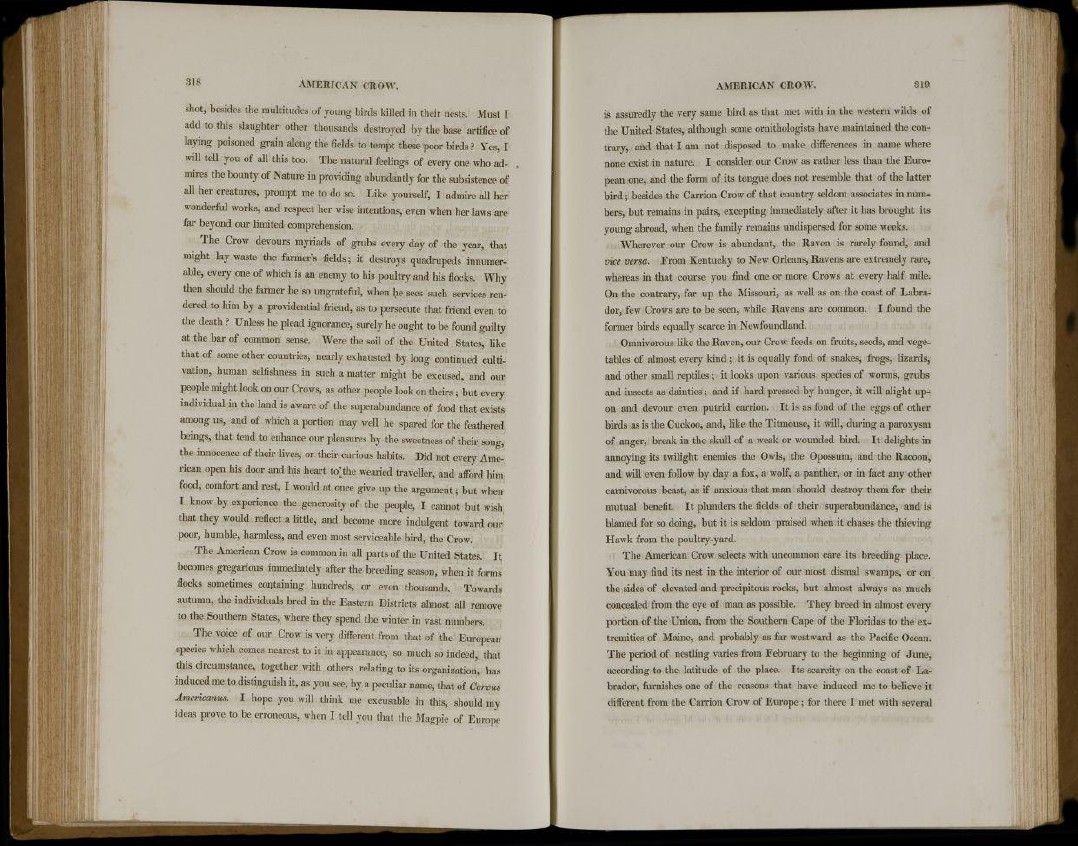
shot, besides the multitudes of young birds killed in their nests. Must I
add to this slaughter other thousands destroyed by the base artifice of
laying poisoned grain along the fields to tempt these poor birds ? Yes, I
will tell you of all this too. The natural feelings of every one who admires
the bounty of Nature in providing abundantly for the subsistence of
all her creatures, prompt me to do so. Like yourself, I admire all her
wonderful works, and respect her wise intentions, even when her laws are
far beyond our limited comprehension.
The Crow devours myriads of grubs every day of the year, that
might lay waste the farmer's fields; it destroys quadrupeds innumerable,
every one of which is an enemy to his poultry and his flocks. Why
then should the farmer be so ungrateful, when \ie sees such services rendered
to him by a providential friend, as to persecute that friend even to
the death ? Unless he plead ignorance, surely he ought to be found guilty
at the bar of common sense. Were the soil of the United. States, like
that of some other countries, nearly exhausted by long continued cultivation,
human selfishness in such a matter might be excused, and our
people might look on our Crows, as other people look on theirs ; but every
individual in the land is aware of the superabundance of food that exists
among us, and of which a portion may well he spared for the feathered
beings, that tend to enhance our pleasures by the sweetness of their song,
the innocence of their fives, or their curious habits. Did not every American
open his door and his heart to~the wearied traveller, and afford him
food, comfort and rest, I would at once give up the argument; but when
I know by experience the generosity of the people, I cannot but wish
that they would reflect a little, and become more indulgent toward our
poor, humble, harmless, and even most serviceable bird, the Crow.
The American Crow is common in all parts of the United States. It
becomes gregarious immediately after the breeding season, when it forms
flocks sometimes containing hundreds, or even thousands. Towards
autumn, the individuals bred in the Eastern Districts almost all remove
to the Southern States, where they spend the winter in vast numbers.
The voice of our Crow is very different from that of the European
species which comes nearest to it in appearance, so much so indeed, that
this circumstance, together with others relating to its organization, has
induced me to distinguish it, as you see, by a peculiar name, that of Corvus
Americamis. I hope you will think me excusable in this, should my
ideas prove to be erroneous, when I tell you that the Magpie of Europe
is assuredly the very same bird as that met with in the western wilds of
the United States, although some ornithologists have maintained the contrary,
and that I am not disposed to make differences in name where
none exist in nature. I consider our Crow as rather less than the European
one, and the form of its tongue does not resemble that of the latter
bird; besides the Carrion Crow of that country seldom associates in numbers,
but remains in pairs, excepting immediately after it has brought its
young abroad, when the family remains undispersed for some weeks.
Wherever our Crow is abundant, the Raven is rarely found, and
vice versa. From Kentucky to New Orleans, Ravens are extremely rare,
whereas in that course you find one or more Crows at every half mile.
On the contrary, far up the Missouri, as well as on the coast of Labrador,
few Crows are to be seen, while Ravens are common. I found the
former birds equally scarce in Newfoundland.
Omnivorous like the Raven, our Crow feeds on fruits, seeds, and vegetables
of almost every kind; it is equally fond of snakes, frogs, lizards,
and other small reptiles ; it looks upon various species of worms, grubs
and insects as dainties; and if hard pressed by hunger, it will alight upon
and devour even putrid carrion. It is as fond of the eggs of other
birds as is the Cuckoo, and, like the Titmouse, it will, during a paroxysm
of anger, break in the skull of a weak or wounded bird. It delights in
annoying its twilight enemies the Owls, the Opossum, and the Racoon,
and will even follow by day a fox, a wolf, a panther, or in fact any other
carnivorous beast, as if anxious that man should destroy them for their
mutual benefit. It plunders the fields of their superabundance, and is
blamed for so doing, but it is seldom praised when it chases the thieving
Hawk from the poultry-yard.
The American Crow selects with uncommon care its breeding place.
You may find its nest in the interior of our most dismal swamps, or on
the sides of elevated and precipitous rocks, but almost always as much
concealed from the eye of man as possible. They breed in almost every
portion of the Union, from the Southern Cape of the Floridas to the extremities
of Maine, and probably as far westward as the Pacific Ocean.
The period of nestling varies from February to the beginning of June,
according to the latitude of the place. Its scarcity on the coast of Labrador,
furnishes one of the reasons that have induced me to believe it
different from the Carrion Crow of Europe; for there I met with several